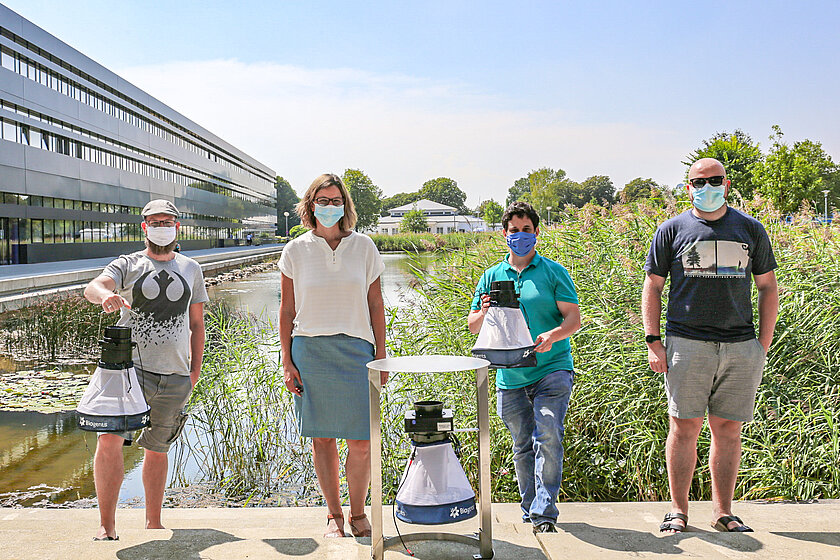Since October 2020, Biogents AG is HNU’s new practice partner in research. In addition to active mosquito research, the globally operating company based in Regensburg, Germany, is primarily dedicated to the production of novel and digitally controlled mosquito traps.
Swammp, the "Swabian Mosquito Monitoring Project", is a research project conducted at HNU’s DigiHealth Institute, in which the remote sensing of shallow waters using satellite imagery has a vital role. In addition, several mosquito traps from Biogents are used to monitor mosquitoes in the field, including two traps with digital mosquito counters. The project will initially be carried out as a pilot study over the next two years.
In a first step, water bodies in the Swabian region of Bavaria and Baden-Württemberg are analysed using data from the European Space Agency's Sentinel-2 satellite constellation and changes in open water areas are quantified over time. At the same time, the local mosquito populations are characterised using Biogents traps near the water bodies themselves, distinguishing native and invasive mosquito species. With kind approval from the state of Baden-Württemberg, Lake Schmiechen, a shallow lake and nature reserve in the Paleo-Danube valley near the town of Schelklingen, is the main test site used for the Swammp pilot study. As an "Asian shallow lake" type, the Lake Schmiechen can be compared with other seasonally changing shallow water bodies on earth commonly serve as mosquito breeding grounds.
HNU and Biogents are thus working together on a new, interdisciplinary research project of increasing epidemiological relevance. The project will contribute to the future development and refinement of risk maps for mosquito-borne diseases. For example, malaria, which is transmitted by mosquitoes of the genus Anopheles, has repeatedly affected large parts of Europe, including Germany, over the past centuries and well into the 1950s. However, the research project also intends to generate new insights into diseases transmitted via invasive species, such as the Asian tiger mosquito Aedes albopictus or the Asian bush mosquito Aedes japonicus, which have been continuously spreading across Europe.
The project, which makes use of digital satellite image analysis and electronic mosquito counting, moreover, strengthens the topic of "digitisation of the health care system", a current research focus at HNU. Initial results of the Swammp project’s test phase will be presented at the IEEE Global Humanitarian Technology Conference (GHTC) in Seattle, USA, on October 30, 2020.
Dr. Martin Schmieder
Scientific Project Management
Strategic Research Funding
Office of the Joint Ethics Committee of the Universities of Bavaria (GEHBa)

Priv.-Doz. Dr. Elmar Buchner
Head of the HNU Doctoral Centre
Research Associate, Research at the Interface of Earth and Health Sciences
University management, strategic research funding








